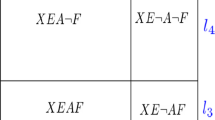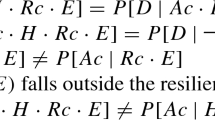Abstract.
The uniform prior distribution is often seen as a mathematical description of noninformativeness. This paper uses the well-known Three Prisoners Paradox to examine the impossibility of maintaining noninformativeness throughout hierarchization. The Paradox has been solved by Bayesian conditioning over the choice made by the Warder when asked to name a(nother) prisoner who will be shot. We generalize the paradox to situations of N prisoners, k executions and m announcements made by the Warder. We then extend the consequences of hierarchically placing uniform and symmetrical priors (for example in the classical N = 3, k = 2, m = 1 scenario) for the probability p of the Warder naming Prisoner B, say. We prove that breaks of indifference and neutrality caused by assignment of uniform and symmetrical priors in lieu of degenerate indifference probabilities hold in general. Speaking of unknown probabilities or of probability of a probability must be forbidden as meaningless. Bruno de Finetti, 1977 I regard the use of hierarchical chains as a technique helping you to sharpen your subjective probabilities. I. J. Good, 1981
Similar content being viewed by others
References
D. Basu (1975) ArticleTitle‘Statistical Information and Likelihood’ Sankhya A 37 1–71
Bayes, T.: 1763, ‘An Essay Towards Solving a Problem in the doctrine of chances’, Published posthumously in Philosophical Transactions of the Royal Society of London 53, 370–418 and 54, 296–325. Reprinted in Biometrika 45 (1958), pp. 293–315, with a biographical note by G. A. Barnard.
J. M. Bernardo (1979) ArticleTitleReference posterior distributions for Bayesian inference Journal of the Royal Statistical Society B 41 113–147
J. M. Bernardo A. F. M. Smith (1994) Bayesian Theory John Wiley and Sons New York
Y. H. Chun (1999) ArticleTitleOn the Information Economics Approach to the Generalized Game Show Problem’ The American Statistician 53 43–51
A. I. Dale (1991) History of Inverse Probability: From Thomas Bayes to Karl Pearson Springer-Verlag Berlin
B. Finetti ParticleDe (1972) Probability, Induction and Statistics JohnWiley and Sons New York
B. Finetti ParticleDe (1975) Theory of Probability John Wiley and Sons New York
De Finetti, B.: 1977, Probabilities of Probabilities: A real Problem or aMisunderstanding?, in A. Aykac and C. Brumat (eds.), New Developments in the Application of Bayesian Methods, North Holland, Amsterdam.
M. H. DeGroot (1970) Optimal Statistical Decisions McGraw-Hill New York
P. Diaconis S. L. Zabell (1982) ArticleTitleUpdating Subjective Probability’ Journal of the American Statistical Association 77 822–830
Good, I. J.: 1981, ‘Some History of the Hierarchical Bayesian Methodology’, in J. M. Bernardo et al. (eds.), Bayesian Statistics, University of Valencia Press, Valencia. Reprinted in Good, I. J.: 1983, Good Thinking: The Foundations of Probability and Its Applications, University of Minnesota, Minnesota.
I. Hacking (1967) ArticleTitle‘Slightly More Realistic Personal Probability’ Philosophy of Science 34 311–325 Occurrence Handle10.1086/288169
C. Howson (1996) ArticleTitle‘Bayesian Rules of Updating’ Erkenntnis. 45 195–208
Howson, C. and P. Urbach: 1993, Scientific Reasoning: The Bayesian Approach, 2nd edn, Open Court, Chicago.
R. Jeffrey (1965) The Logic of Decision McGraw-Hill New York
R. Jeffrey (1992) Probability and the Art of Judgment Cambridge University Press Cambridge
H. Jeffreys (1946) ArticleTitle‘An Invariant Form for the Prior Probability in Estimation Problems Proc Royal Society London A 186 453–461
H. Jeffreys (1961) Theory of Probability University Press Oxford
P. S. Laplace (1774) ArticleTitle‘Mémoire sur la probabilité des causes par les évènemens’ Mémoires de l’Académie Royale des Sciences presentés par divers savans. 6 621–656
Laplace, P. S.: 1812, Théorie Analytique des Probabilités, Courcier, Paris. Reprinted in Laplace, 1878–1912, Oeuvres complètes de Laplace, 14 vols, Gauthier-Villars, Paris.
J. P. Morgan N. R. Chaganty R. C. Dahiya M. J. Doviak (1991) ArticleTitleLet’s Make a Deal: The Player’s Dilemma’ The American Statistician 45 284–289
S. M. Stigler (1982) ArticleTitle‘Thomas Bayes’ Bayesian Inference’ Journal of the Royal Statistical Society A 145 250–258
S. M. Stigler (1986a) The History of Statistics University Press Harvard
S. M. Stigler (1986b) ArticleTitle‘Laplace’s 1774 Memoir on Inverse Probability’ Statistical Science 1 359–378
Author information
Authors and Affiliations
Corresponding author
Rights and permissions
About this article
Cite this article
Wechsler, S., Esteves, L.G., Simonis, A. et al. Indifference, neutrality and informativeness: generalizing the three prisoners paradox. Synthese 143, 255–272 (2005). https://doi.org/10.1007/s11229-005-7016-1
Issue Date:
DOI: https://doi.org/10.1007/s11229-005-7016-1




